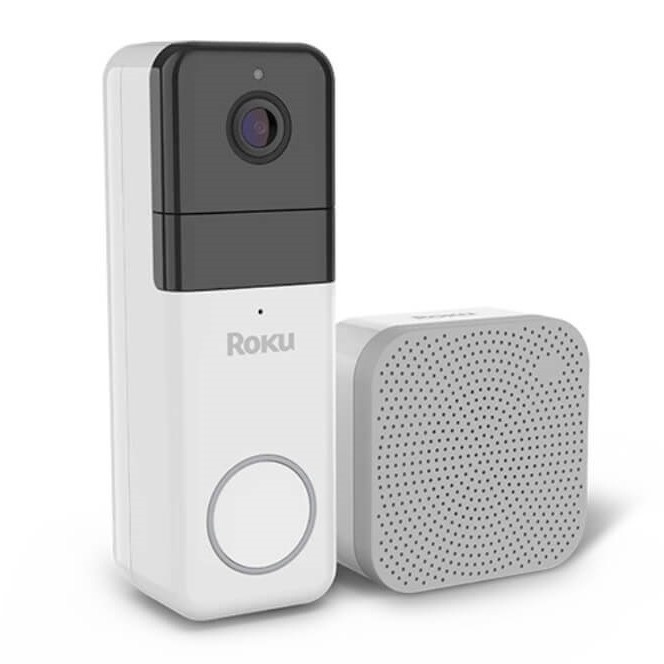Roku's launch of smart doorbells, cameras and lights is another indicator that platform players are prioritizing becoming 'a hub in the home rather than just an entertainment portal,' says analyst Brett Sappington.

After poking around the edges of the TV with products such as connected speakers and soundbars, Roku is now plunging into the smart home arena.
Roku, a company known for connected TVs and streaming players and an operating system that powers them, announced a product line expansion that features security cameras, video doorbells, connected lights and smart plugs. Roku will start selling those products, which integrate with Roku's OS and streaming devices, exclusively at nearly 3,500 Walmart stores starting October 17, with "select products" available online.
Figure 1:  Selling for $99.99, this wire-free video doorbell and chime from Roku supports night vision and can stream HD video to integrated Roku players and Roku TVs.
Selling for $99.99, this wire-free video doorbell and chime from Roku supports night vision and can stream HD video to integrated Roku players and Roku TVs.
(Source: Roku)
Roku's move into the smart home arena will pit it against the likes of Amazon, Samsung and even Comcast – companies that make software platforms for smart TVs and other types of streaming devices and also sell or make various smart home devices that integrate with their software.
Though Roku's new smart home pursuit does focus on devices, the general strategy shows that Roku "is interested in being a software company," Brett Sappington, an analyst who heads up video and entertainment at Interpret, explained. "One trend we see in the smart device space is the interest in being able to support a wide set of devices."
Smart home move a 'natural extension' of Roku's business
Roku, Sappington added, "wants to be more relevant throughout the [smart home] space."
That's become a competitive focus not just for Roku, but for other platform players, including TV makers such as Samsung and LG Electronics.
"It's now a priority for them to become a hub in the home rather than just an entertainment portal," Sappington said.
Update: Major brands are "fighting to be the center" of the home and joining the "battle for the consumer's attention," added Brad Russell, VP of research at Interpret. By way of example, he said Apple's been keying on that idea with its Apple TV-HomeKit integration. Comcast, Russell noted, has also been out in front of that model with its smart home integrations with its X1 platform and home gateways.
"Branching further into the smart home category is a natural extension of our business," Mustafa Ozgen, Roku's president, devices, said in a statement.
By extending its focus to the smart home sector, Roku is hitting on a general growth area in consumer electronics. According to Interpret, about 55% of US adults own one or more smart home device, up from about 15% six or seven years ago. Adoption accelerated during the early stages of the pandemic, but has "remained steady," Russell said.
Roku's additional focus on the smart home also comes to light as the company grapples with slower growth paired with warnings from the financial community that the company is facing headwinds in its distribution business.
Roku's Platform business, which focuses on advertising, content and OS licensing, generated Q2 2022 revenues of $673 million, up 26%. But that was less than expected "as many marketers abruptly curtailed or paused advertising spend in the ad scatter market [TV ads not bought during the ad industry's annual 'upfront' season] during the latter half of Q2," the company said in its latest shareholder letter (PDF).
Roku ended Q2 2022 with 63.1 million active accounts, up 1.8 million year-over-year, but flat when compared to Q1 2022.
Device prices and subscription options
Roku's initial smart home lineup, developed in partnership with Wyze Labs, features floodlight cameras (starting at $99.99), indoor and outdoor cameras (a two-pack of indoor lights starts at $49.99), video doorbells and chimes (starting at $79.99), connected light bulbs (a four-pack of white bulbs fetches $23.99), and smart light strips (a 16-foot spool starts at $22.99).
Roku is also hawking monthly and annual subscription options with its smart home lineup. For an extra $3.99 per month per camera (following a three-month $1 discount) or $39.99 per year per camera (discounted to $29.99 per camera for the first year through November 30, 2022), users get access to features such as person, package, vehicle and pet detection, and video clips that are stored in the cloud for 14 days. Roku's smart home products include certain features, such as live streaming and motion and sound alerts, with or without a subscription.
Roku said its new smart home lineup is certified by the ioXt Alliance, a group focused on IoT security standards, and offers two-factor authentication. Those products also integrate with the company's own Roku Voice platform, as well as with Google Assistant. Roku will add support for Amazon's Alexa platform in early November.
Update: Roku passed word along on October 20 that its Roku Smart Home devices are now compatible with Amazon, beating the original, anticipated timeframe.
Related posts:
Roku taps Fox exec as president of media (press release)
— Jeff Baumgartner, Senior Editor, Light Reading
About the Author(s)
You May Also Like











